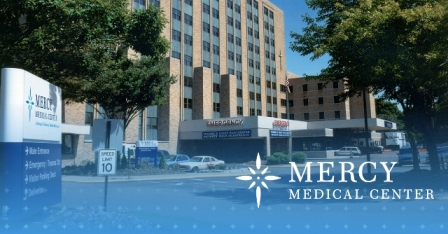Mercy Medical Center receives heart failure reaccreditation from the Society of Cardiovascular Patient Care

Mercy Medical Center Heart Center recently received full heart failure reaccreditation status from the Society of Cardiovascular Patient Care (SCPC).
Heart Failure is a leading cause of morbidity and mortality in the United States. Approximately 5 million adult Americans have heart failure and that number is rapidly increasing as our population ages. In addition, heart failure patients account for 12 to 15 million physician’s office visits per year, 6.5 million hospital days, and a cost of over $21 billion per year.
“Care for heart failure patients is an important part of the services provided by Mercy Heart Center,” said Ahmed Sabe, M.D., executive director, Mercy Cardiovascular Services. “The SCPC’s accreditation means Mercy is managing heart failure patients effectively and efficiently, reducing hospital readmissions, and, most importantly, improving patient outcomes.”
Mercy has demonstrated its expertise and commitment to quality patient care by meeting or exceeding an array of stringent criteria and undergoing a comprehensive onsite review by a team of SCPC’s accreditation review specialists. Hospitals that receive SCPC’s HF Accreditation status employ an evidence-based, protocol-driven and systematic approach to patient management. This allows clinicians to reduce time to treatment and to better risk stratify patients while also reducing length-of-stay.
By achieving SCPC’s Heart Failure Accreditation status, Mercy has demonstrated expertise in the following areas:
- Governance – Recommends proven practices to orchestrate, monitor, and optimize clinical processes.
- Community Outreach – Increases public awareness and affect behavior with education, website content, public service, announcements, and partnerships with local businesses, employers, and healthcare providers.
- Pre-Hospital Care – Integrates out-of-hospital interventions delivered by community healthcare providers and first responders.
- Early Stabilization – Speeds diagnosis and treatment to mitigate immediate life threatening conditions. Improved risk stratification and patient flow.
- Acute Care – Employs a multidisciplinary, patient-centric approach from observation (or admission) through discharge to ensure an appropriate length-of-stay and optimal patient outcome.
- Transitional Care – Prevents unnecessary re-admissions with established care coordination at discharge, including early follow-up care and patient/family education.
- Clinical Quality Measures – Tracks the entire process from patient presentation through discharge and follow-up care to identity problem areas, duplication of efforts, or wasted resources. Measure performance and outcomes then use the data to improve quality.
About the Society of Cardiovascular Patient Care
The Society of Cardiovascular Patient Care (SCPC) is an international, nonprofit organization that focuses on transforming cardiovascular care by assisting facilities in their efforts to create cardiovascular centers of excellence that deliver quality care and patient satisfaction in a cost sensitive environment. As the accreditation services arm of the American College of Cardiology, SCPC offers individual hospitals and hospital systems the support needed to effectively reduce variations of care and bridge existing gaps in treatment. Through its collaboration with actively engaged, multidisciplinary teams, SCPC is Taking Science to the Bedside™ and improving outcomes in the management of heart disease. For more information about SCPC's accreditation and certification opportunities, visit www.scpc.org, or call toll-free 1-877-271-4176.
Mercy Medical Center is a ministry of the Sisters of Charity Health System.

- Sisters of Charity Health System
- News Releases
- St. Vincent Charity Health Campus
- Light of Hearts Villa
- Regina Health Center
- Sisters of Charity Foundation of Canton
- Sisters of Charity Foundation of Cleveland
- Sisters of Charity Foundation of South Carolina
- Building Healthy Communities
- Catholic Community Connection
- Early Childhood Resource Center
- Healthy Learners
- Joseph and Mary's Home
- South Carolina Center for Fathers and Families